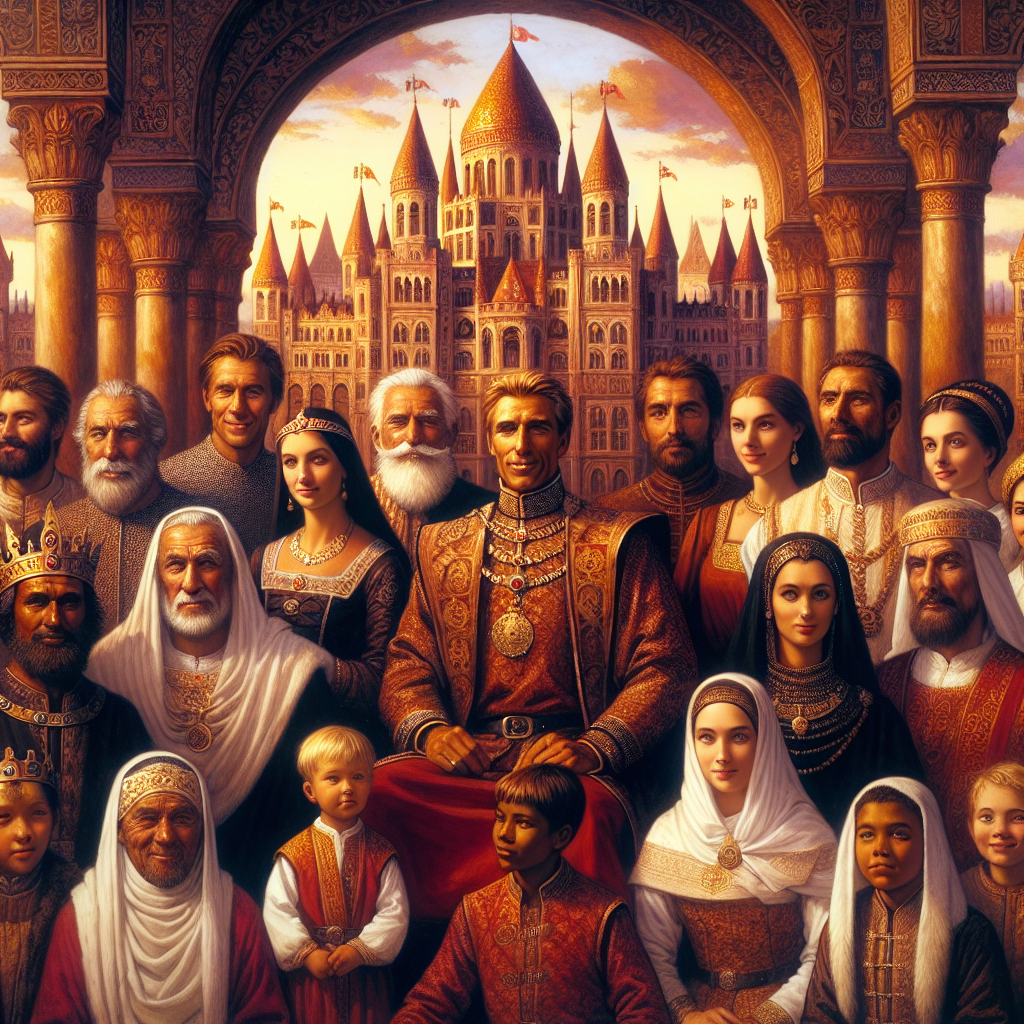The Ottoman Empire, one of history’s most formidable dynasties, owes much of its success to the vision and leadership of Osman Ghazi, its founder. Yet, Osman’s accomplishments were not his alone. His family played a pivotal role in establishing and expanding this vast empire, combining familial bonds with strategic foresight to build a lasting dynasty. This blog explores the influential figures within Osman’s family and their contributions to the birth and growth of the Ottoman Empire.
Osman’s Path to Founding an Empire
Osman Ghazi is celebrated as the founder of the Ottoman Empire, but his success was deeply rooted in the groundwork laid by his forebears. With a keen sense of diplomacy and military prowess, Osman transformed the modest Kayi tribe into a formidable power. His leadership was instrumental in uniting various tribes and forging alliances that expanded his influence well beyond his initial territories.
Osman’s personal drive and vision for a sovereign state were heavily influenced by his upbringing, ideals, and the environment crafted by his family. His success was not merely a function of ambition but also a testament to the collective efforts of his family members, each contributing uniquely to the empire’s foundation.
Ertuğrul Ghazi and the Making of a Dynasty
Osman’s father, Ertuğrul Ghazi, laid the vital groundwork for the future Ottoman Empire. As the leader of the Kayi tribe, Ertuğrul was instrumental in establishing crucial alliances and securing territorial gains that would later become the stepping stones for Osman’s conquests. His leadership style and vision for a unified state deeply inspired Osman, embedding the values of courage and strategic foresight in him.
Ertuğrul’s legacy is not just one of territorial expansion but also of creating a narrative of unity and resilience. His ability to lead and inspire a fragmented group into a coherent force set the stage for Osman to dream of a larger, unified empire. This narrative of unification and strength became a defining characteristic of the Ottoman Empire.
Halime Hatun and Maternal Influence
The maternal influences in Osman’s life were equally profound. Halime Hatun, his mother, played a significant role in shaping his character and leadership qualities. Her influence extended beyond traditional roles, involving herself in tribal leadership and decision-making processes that would be crucial in Osman’s formative years.
In a time when women’s roles were often understated, Halime Hatun demonstrated the power of maternal guidance. She instilled in Osman the importance of empathy, wisdom, and resilience—traits that would define his leadership style. Her involvement in tribal affairs set a precedent for the influential roles women would continue to play in the Ottoman dynasty.
Malhun Hatun’s Political Alliances
Osman’s marriage to Malhun Hatun was not purely a personal affair—it was a strategic alliance that bolstered his political standing. Malhun came from a lineage connected to powerful political and religious figures, including Sheikh Edebali, a notable spiritual leader. This connection significantly enhanced Osman’s legitimacy and influence among other Turkish tribes.
The marriage strengthened Osman’s position, allowing him to weave a network of alliances that would prove crucial in his campaigns. Malhun Hatun, through her lineage, brought not only prestige but also a wealth of strategic alliances that facilitated Osman’s early expansions and consolidations.
Bala Hatun and Diplomatic Strength
Bala Hatun, another of Osman’s wives, also played a critical role in his political maneuvers. Her marriage to Osman was strategic, linking him with influential Turkish tribes and further cementing his leadership position. Bala’s contributions went beyond personal support; she was actively involved in diplomacy and governance, offering insights that complemented Osman’s ambitions.
Her partnership with Osman exemplifies how marriages during this period were not just personal unions but strategic tools that shaped political landscapes. Through her, Osman was able to strengthen ties with other tribes, ensuring loyalty and unity among his followers.
Orhan Ghazi’s Expansions
Orhan Ghazi, Osman’s son, succeeded him as the second ruler of the Ottoman Empire, carrying forward the legacy with vigor. His reign was marked by significant military conquests, including the capture of Bursa, which became a crucial administrative center. Orhan’s strategic mind and reforms laid the foundations for a more structured and efficient empire.
His diplomatic strategies were revolutionary for the time, including alliances with Byzantine factions through marriages, such as his union with Theodora. These alliances were not only about peace but also about integrating diverse cultures and ideas, which enriched the empire’s fabric and extended its influence.
Alaeddin Pasha’s Governance
Alaeddin Pasha, another of Osman’s sons, focused on the internal affairs of the empire, playing an advisory role that was critical in shaping its governance. He was instrumental in forming the early legal and administrative frameworks that would support the empire’s growth. His influence in establishing the first Ottoman military corps underscored his strategic vision for a disciplined and organized state.
Through his contributions, Alaeddin ensured that the empire was not only expanding territorially but was also building robust institutions that could handle the complexities of a growing state. His foresight in governance set a standard for future rulers, emphasizing the need for strong internal structures.
Sheikh Edebali’s Spiritual Guidance
Sheikh Edebali, Osman’s father-in-law, provided the spiritual and intellectual underpinning for Osman’s vision of governance. His teachings on justice and morality had a profound influence on Osman, shaping his ideology and leadership style. Edebali’s role in legitimizing Osman’s rule among tribes and religious figures cannot be overstated.
Edebali’s guidance helped Osman blend spirituality with politics, creating a governance model that emphasized ethical leadership. His teachings became a moral compass for the empire, influencing policies and decisions that prioritized justice and fairness.
Women’s Role in Shaping the Empire
Women in Osman’s family, such as Halime Hatun and Malhun Hatun, were pivotal in shaping the cultural and social framework of the Ottoman Empire. Their influence extended to diplomacy, tribal alliances, and maintaining family stability. They exemplified the critical roles women played in governance and societal development, often acting as the glue that held the empire together during turbulent times.
These women’s contributions highlight the multidimensional roles women played, challenging the traditional narratives of governance and power. Their involvement was crucial in fostering a stable and cohesive family structure, which was essential for a thriving empire.
Orhan’s Reign and Early Conquests
Orhan Ghazi’s reign was characterized by military prowess and administrative acumen. His successful campaigns expanded the empire’s borders, while his reforms strengthened its foundations. The capture of Bursa was a turning point, providing the Ottomans with a strategic foothold that facilitated further expansions.
Orhan’s ability to balance military ambitions with administrative reforms ensured that the empire was both powerful and sustainable. His reign set a precedent for future leaders, emphasizing the importance of strategic planning and efficient governance in the empire’s success.
The Legacy of Osman’s Descendants
The legacy of Osman Ghazi’s family is evident in the continued expansion and consolidation of the Ottoman Empire under his descendants. His grandson, Murad I, further extended the empire’s territories, building on the foundations laid by Osman and Orhan. The early conquests and strategic marriages of Osman’s family members were crucial in establishing a centralized and cohesive rule.
This legacy of expansion and governance created a dynasty that would influence the course of history for centuries. The strategic foresight and leadership qualities of Osman’s family members were instrumental in shaping the empire’s future.
Reflecting on Osman’s Family Influence
Osman Ghazi’s family played a central role in the rise and success of the Ottoman Empire. Their contributions to governance, diplomacy, and expansion were vital in establishing a dynasty that would leave a profound mark on history. The influence of both men and women in Osman’s family highlights the importance of unity and collaboration in achieving greatness.
The legacy of Osman’s family serves as a testament to the power of strategic alliances and visionary leadership. Their story is not just one of conquest but also of building a cohesive and lasting empire through wise governance and strong familial bonds.
Read More :: Read More Osman Ghazi Blog.
Osman’s Dream: The History of the Ottoman Empire
A books on Osman Ghazi, the Ottoman Empire, and related historical themes available on Amazon that may interest you:
Author: Caroline Finkel
Link: Osman’s Dream








